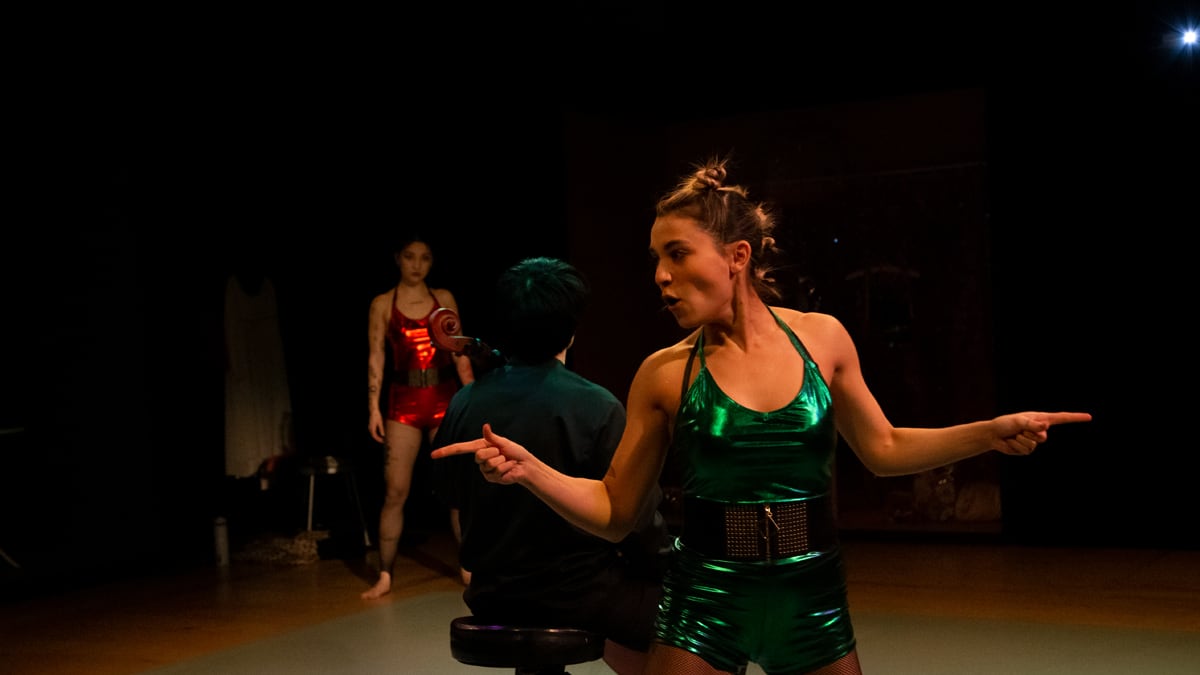When you walk into Shaking the Tree Theatre to see Chick Fight, eight dioramas surround the square stage space. Archetypal symbols of femininity compete with contemporary representations of womanhood in each installation.
Serpentine women bestow pomegranates. A deep-blue pregnant belly hovers above bright red baby dolls. A film noir femme fatale grins in a silent projection, and a printer continuously spits out images of Lindsay Lohan, Britney Spears or Medusa.
The attention to detail in each diorama is so elegant it’s disconcerting. It’s all fairy tale, folkloric Jungian stuff in the wheelhouse of director Samantha Van Der Merwe, whose aesthetic always feels lovingly handcrafted and conceptually rigorous.
Van Der Merwe puts you in touch with the unconscious. For Chick Fight, that’s where we need to be at the top of the show—in those subterranean places where the most personal and universal conflicts unfold, where we fight within ourselves, and then outside ourselves. Or is it the other way around?
Chick Fight is dope because it dramatizes the continuum between the inner and outer worlds. It’s first fight is sparked by a rude exchange between SHE (Kayla Hanson) and HER (Rebby Yuer Foster) that immediately and hilariously becomes epic, but we soon see that it’s not funny.
The stage space becomes a boxing ring. What follows is a series of rounds that pit the women against each other in a fight to the death. Each round is a vignette that corresponds loosely, sometimes explicitly, to the dioramas surrounding the stage. An omniscient male voice (Sam Dinkowitz), humorous but sinister, presides over the fights.
By using a framing device that forces the characters to fight, win or lose, retire to their respective corners, change outfits, then reincarnate in a new round, Chick Fight takes on a cosmic stature. Outward appearances and relationships change, but conflict remains constant and eternal.
Chick Fight asks if the women in it can do anything to break this cycle, and it doesn’t settle for easy answers, compelling us to think about how women are made monsters in our cultural hive mind.
A three-dimensional human being can’t exist within the impossibly rigid, two-dimensional conceptions imposed on them by society. If women must be either good or bad, madonna or whore, young or worthless, totally safe or totally unsafe, then they’re never who they really are.
So what happens when those oppressive external standards are internalized? What happens when these women forget who they are and become what a disembodied man’s voice tells them to be?
Whatever the answer is, it’s inescapably violent.
Chick Fight is a devised piece. At its best, devised theater is the highest form of theater because it’s the most collaborative. It’s not pyramidical, top-down “I wrote this now you make it” theater. It’s “let’s make this shit together from scratch” theater.
For actors, the devising process is especially rewarding, because they get to have a sense of ownership over their performances—and that comes through here. Hanson and Foster clearly care for this work, and importantly, for each other. That carries a lot of weight in a play that pits them against each other for our entertainment.
Chick Fight is an example of devised theater doing what it’s supposed to. Between the lighting by Griffin Dewitt, the cello by Armon LaLonde, and the words by Sara Jean Accuardi, it feels like an organic, integrated, singular, vision (devised plays, when done poorly, are too often a hodgepodge of half-baked ideas).
The only problem with Chick Fight is that its movement sequences are undercooked. The strings of physicality and gesture lack complexity and dimension. The choreography isn’t visceral or particularly interesting. And sometimes (like in the vignette where the two women romance) the drama in the text is overstated, so the acting in those moments feels too actorish. But, since realism isn’t the point here, it’s not annoying.
So go see Chick Fight. And when you do, ask yourself if there are voices in your unconscious telling you to play stupid games in order to win stupid prizes. If there are, well then…what are you gonna do about it?
SEE IT: Chick Fight plays at Shaking the Tree Theatre. 823 SE Grant St., 503-235-0635, shaking-the-tree.com. 7:30 pm Thursday-Saturday and 5:00 Sunday through April 2nd. $5-$30.
